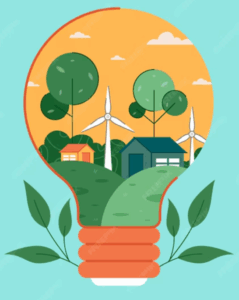What is Eco Church all about?
When Emmanuel Church was constituted in 2018, we made an important commitment to God’s mission – that we would ‘safeguard the integrity of creation, and sustain and renew the life of the earth’.
At that time, one particular vision we had in making an environmental and sustainable difference was to invest in design, construction and maintenance of an energy efficient church building. This vision is somewhat fulfilled, but we did not want to stop there. More recently, in 2024, we enrolled in the A Rocha UK Eco Church programme.
 A Rocha UK is an international charity that shares our values, encouraging environmental change and sustainability. Their Eco Church survey is a framework to support both Churches and Christians in England and Wales to take practical action in caring for God’s earth. The survey focuses on five key areas of church life:
A Rocha UK is an international charity that shares our values, encouraging environmental change and sustainability. Their Eco Church survey is a framework to support both Churches and Christians in England and Wales to take practical action in caring for God’s earth. The survey focuses on five key areas of church life:
• Worship and teaching
• Buildings and energy
• Land and nature
• Community and global engagement
• Lifestyle
The Eco Church survey has been helping us establish new ways to make a difference in all these areas. And, it’s not all about the obvious large scale changes – small lifestyle choices and changes also make a big difference in the long term. These could be as simple as, in our daily routine, turning off the tap while we brush our teeth, or choosing lower carbon travel alternatives to driving a car.
With our efforts so far, Emmanuel Church has been commended by A Rocha UK with an Eco Church Bronze Award and is now working towards Silver and Gold.
If you would like to join us on this journey in caring for God’s Earth, start today! You can find some inspiration on this page for simple things you can do to make a difference, many of which cost nothing and save you money whilst helping to protect our beautiful planet. Please also see our monthly magazines with articles specially prepared by the Eco Church team. There is an archive of these articles on this page. You’ll also find links to other resources and organisations, as well as some resources to aid theological reflection on why we are called to care for creation.
Our Eco Church policy below provides some clear insight and more detailed understanding of the commitments Emmanuel Church has agreed to take in being more environmentally responsible and sustainable.
We hope you find this page helpful and inspiring as we work together to achieve the Silver and Gold Eco Church awards. Please email us with any ideas you have, and other resources you think we should link to. Thank you!
The Eco Church team
ecochurch@emmanueleastbourne.org.uk
Useful Links and Resources
United Reformed Church Greener Church
United Reformed Church Environmental Policy
Methodist Church Action for Hope – Net zero carbon by 2030
Green Christian – promoting prayer, hope and action
Climate Change Committee – the UK’s independent adviser on tackling climate change
Eastbourne ECO Action Network – Making Eastbourne Carbon Neutral by 2030
Energise Sussex Coast – working together to end fuel poverty and protect the environment
MCS – micro certification scheme to find installers for renewables, heat pumps etc.
360 Carbon – Carbon Footprint Calculator
Blue Heart – mitigating the impact of flooding in Eastbourne
Climate Stewards – Resources for reducing your carbon footprint
Reflections: why we are called to care for the planet
Methodist Church Creationtide Resources
Alex Mabbs – Life and faith in a warming world
Creation Psalms – Biblical Spirituality for an ecological crisis
God saw that it was good – films and handbooks for reflection
Emmanuel Church Eastbourne – Creation themed daily devotionals
Archive of Eco Church articles
Here are some church magazine articles and other reflections from the Eco Church team and other members of Emmanuel Church.
Click here to view complete archive in new window.
Latest news and events
Click here to view all news and events in new window.
Simple ideas to make a difference

There are many no-cost behavioural change ideas below. These often provide the biggest immediate impact and savings on your energy bills, while the higher-cost investments typically pay for themselves over time through reduced utility costs. Some may qualify for government grants or schemes. Please email us with other ideas to add!
Daily Habits
- Switch off electronics at the wall when not in use (don’t leave on standby)
- Take shorter showers and turn water off while soaping
- Use a clothes horse or washing line instead of the tumble dryer
- Wash clothes at 30°C or use eco settings
- Turn off lights when leaving rooms
- Close curtains during hot days to block heat
- Put on a jumper (or several layers) instead of turning up the heating
- Close doors to unused rooms and turn off radiators
- Use a hairdryer less frequently
Cooking & Kitchen
- Use a microwave or halogen oven instead of the main oven
- Match saucepan sizes to hob rings
- Use lids on saucepans to cook faster
- Let hot food cool before putting in the fridge
- Keep your fridge and freezer full but not overcrowded
- Boil only the water you need in the kettle, and keep a thermos flask next to the kettle to store any excess hot water for the next cuppa.
Transport
- Walk, cycle, or use public transport for short journeys
- Combine errands into one trip
- Work from home when possible
- Share lifts or use car-sharing schemes
- Use train or bus travel instead of flying wherever possible (get a railcard for discounted train travel)
- If you have one, keep your car well-maintained with properly inflated tires
Technology
- Enable power-saving modes on devices
- Close unused browser tabs and applications
- Turn off Bluetooth when not needed
- Stream less video content or reduce quality settings
Water Conservation
- Fix dripping taps promptly
- Install water-saving shower heads and tap aerators
- Turn the tap off while you’re brushing your teeth
- Only run dishwashers and washing machines with full loads
- Have shorter showers
- Install a ‘water hippo’ or place a couple of bricks in your toilet cistern to reduce the amount of water used for flushing
- Use rainwater butts for watering plants rather than a hosepipe
- Wash your car with a bucket and sponge, not a hose pipe or, worse still, a pressure washer!
Consumption & Waste
- Reduce food waste through meal planning and using leftovers
- Eat less meat, particularly beef which has a high carbon footprint
- Mend items instead of replacing them
- Make things last longer
- Buy second-hand furniture instead of new
- Join local tool libraries or community tool shares
- Participate in allotments or community gardens
- Organise a group for bulk purchasing
- Take part in clothes swaps and repair cafés
Simple Purchases
- Switch to LED light bulbs
- Install reflectors behind radiators on external walls (e.g. radflek, other alternatives are available)
- Use reusable shopping bags, water bottles, and coffee cups
- Choose electronic receipts instead of paper
- Use bar soap instead of liquid soap in plastic bottles
- Make cleaning products with white vinegar and bicarbonate of soda
- Use a safety razor instead of disposable razors
- Choose solid shampoo and conditioner bars
- Buy British seasonal produce from local farmers’ markets
- Shop at zero-waste shops / refill stations with your own containers, for dry foods, cleaning products and toiletries etc.
- Choose products with minimal packaging
- Purchase environmentally friendly toilet paper and kitchen roll (e.g. WGAC or Naked Paper)
- Buy from charity shops and second-hand shops
- Borrow or hire items you rarely use instead of buying
- Choose Fairtrade and organic products when possible
Energy
- Switch to a green energy tariff with renewable electricity like Ecotricity, Good Energy, or Octopus Energy
- Get a smart meter to better monitor energy usage
- Turn down your boiler thermostat to 60°C
- Set your room thermostat 1-2°C lower in winter
Banking
- Choose banks like Triodos Bank or Ecology Building Society that don’t invest in fossil fuels
Home Efficiency
- Use standby savers (smart plugs that cut standby power)
- Lag your hot water cylinder (if you have one) and pipes
- Draught-proof windows and doors with strips or sealant
- Install a water butt for garden watering
Garden & Outdoor
- Plant native British species that need less water
- Use a manual cylinder mower instead of petrol-powered. And mowing less often is good for wildlife.
- Start home composting
- Plant trees for natural cooling and carbon absorption
- Create a wildlife-friendly garden to support biodiversity
Major Purchases and home improvements
- Replace old appliances with A+++ energy-rated models
- Install a smart thermostat with zone controls
- Choose a more fuel-efficient or electric car when replacing
- Improve loft and cavity wall insulation
- Install double or triple glazing
- Upgrade to an air source or ground source heat pump, or if that’s not possible to an efficient condensing combi boiler
- Add external wall insulation if suitable
- Install solar PV panels (with government Smart Export Guarantee)
- Major whole-house insulation upgrades
- Install solar thermal for hot water

